This article provides step-by-step instructions on how to configure your Gmail account on Outlook Express so that you access it using POP3 (Post Office Protocol 3); Or in layman's terms, how you can receive your Gmail emails and store them on your system.
The POP access was allowed on Gmail accounts almost from the start of the service... and the best thing... it's free!
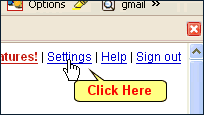
Now click on the Forwarding and POP tab.

In the POP Download section, you can enable POP for all email messages or only for mail that you will receive henceforth.

From a drop down menu, you can select what you want to do with the message once it is downloaded to Outlook Express on your system. I suggest that you let it lie on your Gmail account or archive it since there is so much of space available on Gmail.

Click on the Save Changes button when you are done.
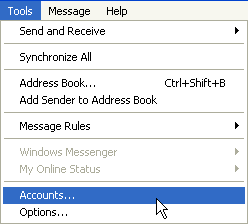
In the Internet Accounts pop-up window, click on Add -> Mail
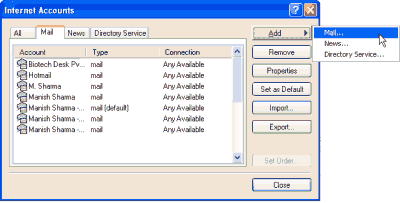
You now need to give a name to this account. I'm going to put WebDevelopersNotes as the name (my email address is webdevelopersnotes[at]gmail.com). Click on the Next button.
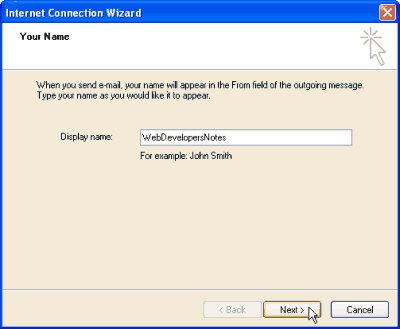
You will now be asked your Gmail email address. Be sure to enter this correctly and then click on the Next button.
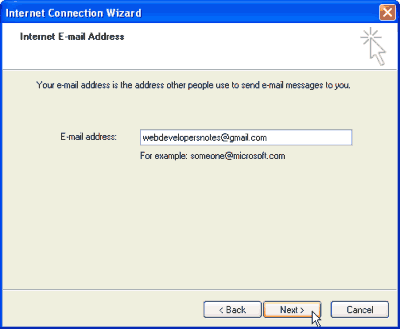
The next step is to provide the Outlook Express email client the incoming and outgoing email server details for Gmail. These are:
Incoming Email Server: pop.gmail.com
Outgoing Email Server: smtp.gmail.com
Make sure that you have selected the POP3 option in the My incoming email server is. Click on the Next button when done.
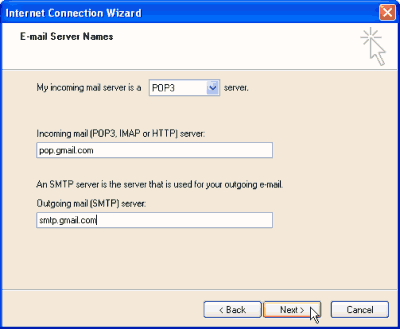
We will now enter the username and password of your Gmail account in Outlook Express. Click on the Remember password checkbox if it's not already checked. Click on the Next button when done.
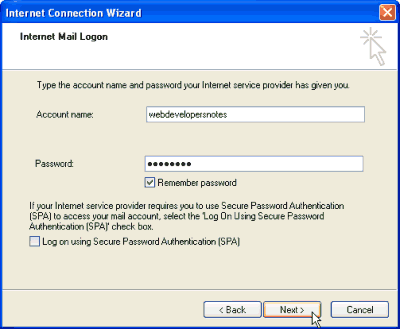
By this time you have given all the information to Outlook Express to set up your Gmail account on the program and so you get a congratulatory message. Click on the Finish button.
However, we are not done yet and need to configure a few more things.
Double-click on the Gmail email account you have just configured in Outlook Express. You can also select it and click on the "Properties" button. Refer image below.
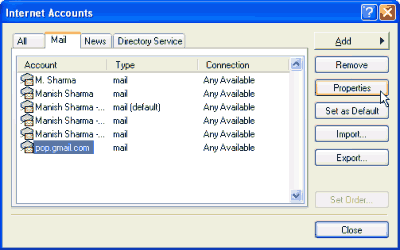
The "Properties window" is now displayed. Go to the Advanced tab and check the checkbox in front of This server requires a secure connection (SSL). The Incoming mail (POP3): field automatically changes to a value of 995. Click on the Apply button when done. Refer image below esp. the portion marked in the red box.
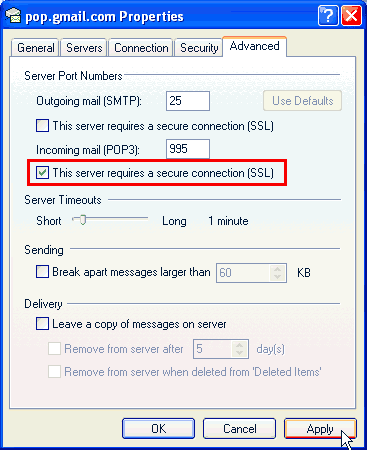
It is now time for you to test the Gmail account configured in Outlook Express. If you had selected the option of enabling POP at Gmail for only new messages, send a test message to your Gmail account from another email address.
This issue can quickly be ironed out by changing the Outgoing (SMTP) settings. Under the "Advanced" tab, put 465 as the server port number and check "This server requires a secure connection (SSL)" - please refer image below.
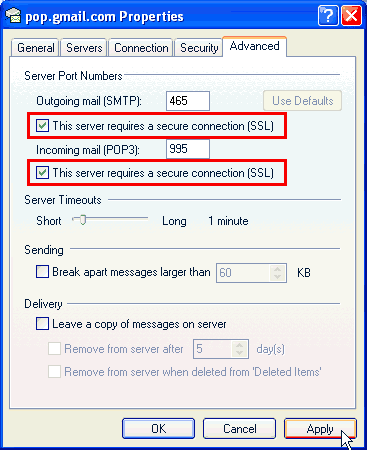
Lastly, move to the "Servers" tab and check "My server requires authentication".
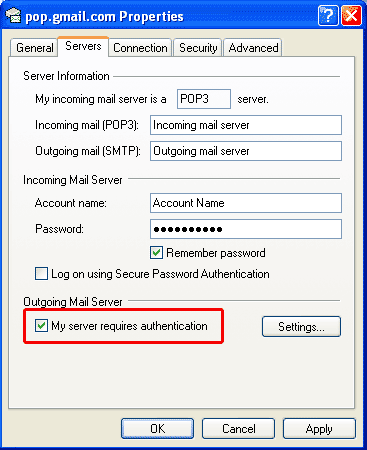
The POP access was allowed on Gmail accounts almost from the start of the service... and the best thing... it's free!
Step 1 - Enable the POP option at your Gmail account
Log in at your Gmail account. Click on the Settings link on the top-right of the page.
Now click on the Forwarding and POP tab.

In the POP Download section, you can enable POP for all email messages or only for mail that you will receive henceforth.

From a drop down menu, you can select what you want to do with the message once it is downloaded to Outlook Express on your system. I suggest that you let it lie on your Gmail account or archive it since there is so much of space available on Gmail.

Click on the Save Changes button when you are done.
Step 2 - Configuring the Outlook Express Email client
Start Outlook Express. Go to Tool -> Accounts.
In the Internet Accounts pop-up window, click on Add -> Mail

You now need to give a name to this account. I'm going to put WebDevelopersNotes as the name (my email address is webdevelopersnotes[at]gmail.com). Click on the Next button.

You will now be asked your Gmail email address. Be sure to enter this correctly and then click on the Next button.

The next step is to provide the Outlook Express email client the incoming and outgoing email server details for Gmail. These are:
Incoming Email Server: pop.gmail.com
Outgoing Email Server: smtp.gmail.com
Make sure that you have selected the POP3 option in the My incoming email server is. Click on the Next button when done.

We will now enter the username and password of your Gmail account in Outlook Express. Click on the Remember password checkbox if it's not already checked. Click on the Next button when done.

By this time you have given all the information to Outlook Express to set up your Gmail account on the program and so you get a congratulatory message. Click on the Finish button.
However, we are not done yet and need to configure a few more things.
Double-click on the Gmail email account you have just configured in Outlook Express. You can also select it and click on the "Properties" button. Refer image below.

The "Properties window" is now displayed. Go to the Advanced tab and check the checkbox in front of This server requires a secure connection (SSL). The Incoming mail (POP3): field automatically changes to a value of 995. Click on the Apply button when done. Refer image below esp. the portion marked in the red box.

It is now time for you to test the Gmail account configured in Outlook Express. If you had selected the option of enabling POP at Gmail for only new messages, send a test message to your Gmail account from another email address.
Problems with Gmail configuration on Outlook Express
The above procedure works beautifully for most people. However, some are just not able to send email from the newly configured Gmail account on Outlook Express; they have no problem in receiving messages.This issue can quickly be ironed out by changing the Outgoing (SMTP) settings. Under the "Advanced" tab, put 465 as the server port number and check "This server requires a secure connection (SSL)" - please refer image below.

Lastly, move to the "Servers" tab and check "My server requires authentication".









No comments:
Post a Comment